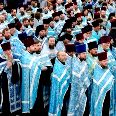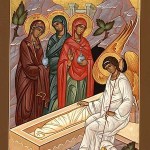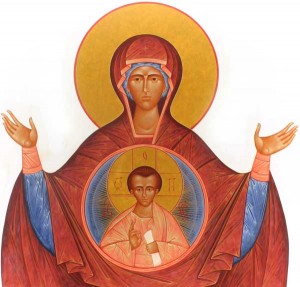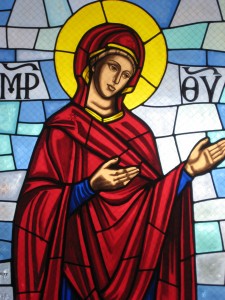by Fr. John A. Peck
 Dormition is one of the Twelve Great Feasts of the Christian faith. Of course, this is a great preaching opportunity, so we here at Preachers Institute, are offering an article on Dormition and a few things which we hope you will find valuable as you prepare this festal sermon.
Dormition is one of the Twelve Great Feasts of the Christian faith. Of course, this is a great preaching opportunity, so we here at Preachers Institute, are offering an article on Dormition and a few things which we hope you will find valuable as you prepare this festal sermon.
1. Preach the Gospel
 Don’t forget to preach the Gospel – tell your listeners the Good News! The only reason we are celebrating Dormition at all is because of the incarnation, suffering, death and resurrection of our Lord Jesus Christ. In fact, the feast of the Dormition is, indeed, a feast of resurrection! Be sure to make this connection to every listener with clarity. You may wish to treat this feast as a real opportunity to preach the Resurrection to those who may never get another chance to hear it!
Don’t forget to preach the Gospel – tell your listeners the Good News! The only reason we are celebrating Dormition at all is because of the incarnation, suffering, death and resurrection of our Lord Jesus Christ. In fact, the feast of the Dormition is, indeed, a feast of resurrection! Be sure to make this connection to every listener with clarity. You may wish to treat this feast as a real opportunity to preach the Resurrection to those who may never get another chance to hear it!
This is a resurrectional feast!
2. About the Feast Itself
The word ‘Dormition’ simply means ‘falling asleep’ – the biblical idiom for a believer’s death.
The Dormition (Falling Asleep) of the Theotokos is one of the Great Feasts of the Orthodox Church, celebrated on August 15. This feast is called the Assumption in the western churches, and commemorates the death, resurrection and glorification of the Virgin Mary, Christ’s mother. It proclaims that Mary has been “assumed” by God into the heavenly kingdom of Christ in the fullness of her spiritual and bodily existence.
 The Tradition of the Church is that Mary died as all people die, not “voluntarily” as her Son, but by the necessity of her mortal human nature which is indivisibly bound up with the corruption of this world.
The Tradition of the Church is that Mary died as all people die, not “voluntarily” as her Son, but by the necessity of her mortal human nature which is indivisibly bound up with the corruption of this world.
The Orthodox Church teaches that Mary is without personal sins. In the Gospel of the feast, however, in the liturgical services and in the Dormition icon, the Church proclaims as well that Mary truly needed to be saved by Christ as all human persons are saved from the trials, sufferings and death of this world; and that having truly died, she was raised up by her Son as the Mother of Life and participates already in the eternal life of paradise which is prepared and promised to all who
“hear the word of God and keep it.” (Luke 11:27-28)
The services of the feast repeat the main theme, that the Mother of Life has
“passed over into the heavenly joy, into the divine gladness and unending delight” of the Kingdom of her Son. (Vesper verse)
The Old Testament readings, as well as the gospel readings for the Vigil and the Divine Liturgy, are exactly the same as those for the feast of the Virgin’s nativity and her entrance into the Temple. Thus, at the Vigil we again hear Mary say:
“My soul magnifies the Lord and my Spirit rejoices in God my Saviour.” (Luke 1:47)
At the Divine Liturgy we hear the letter to the Philippians where St. Paul speaks of the self-emptying of Christ who condescends to human servitude and ignoble death in order to be
“highly exalted” by God his Father. (Philippians 2:5-11)
And once again we hear in the Gospel that Mary’s blessedness belongs to all who
“hear the word of God and keep it.” (Luke 11:27-28)
Thus, the feast of the Dormition of the Theotokos is the celebration of the fact that all men are “highly exalted” in the blessedness of the victorious Christ, and that this high exaltation has already been accomplished in Mary the Theotokos. The feast of the Dormition is the sign, the guarantee, and the celebration that Mary’s fate is, the destiny of all those of “low estate” whose souls magnify the Lord, whose spirits rejoice in God the Saviour, whose lives are totally dedicated to hearing and keeping the Word of God which is given to men in Mary’s child, the Saviour and Redeemer of the world.
Finally it must be stressed that, in all of the feasts of the Virgin Mother of God in the Church, the Orthodox Christians celebrate facts of their own lives in Christ and the Holy Spirit.
What happens to Mary happens to all who imitate her holy life of humility, obedience, and love.
With her all people will be “blessed” to be “more honorable than the cherubim and beyond compare more glorious than the seraphim” if they follow her example. All will have Christ born in them by the Holy Spirit. All will become temples of the living God. All will share in the eternal life of His Kingdom who live the life that Mary lived.
In this sense everything that is praised and glorified in Mary is a sign of what is offered to all persons in the life of the Church. It is for this reason that Mary, with the divine child Jesus within her, is call in the Orthodox Tradition the Image of the Church. For the assembly of the saved is those in whom Christ dwells.
3. About The Dormition Fast
 For the first fourteen days of August during each year, the Holy Orthodox Church enters into a strict fast period in honor of the Mother of God, the Virgin Mary.
For the first fourteen days of August during each year, the Holy Orthodox Church enters into a strict fast period in honor of the Mother of God, the Virgin Mary.
Every Orthodox Christian is aware and generally knows the reason behind the fasts for Pascha and Christmas. But while they may know of the Dormition Fast, few follow it, and more than a few question why it is there, neither knowing its purpose.
First, given the pervasive misunderstanding of the purpose of fasting itself, a refresher on its purpose is always a good idea. There is a perception that we should fast when we want something, as though the act of fasting somehow appeases God, and seeing us “suffer” gets Him to grant our request. Nothing can be further from the truth. It is not our fasting that pleases God, it is the fruits of our fast (provided we fast in the proper mind set, and do not merely diet) that please Him.
We fast, not to get what we want, but to prepare ourselves to receive what God wants to give us. The purpose of fasting is to bring us more in line with another Mary, the sister of Lazarus, and away from their sister Martha, who in the famous passage was
“anxious and troubled about many things.”
Fasting is intended to bring us to the realization of
“the one thing needful.”
It is to help us put God first and our own desires second, if not last. As such it serves to prepare us to be instruments of God’s will, as with Moses in his flight from Egypt and on Mt. Sinai, as well as our Lord’s fast in the wilderness. Fasting turns us away from ourselves and toward God. In essence it helps us become like the Theotokos, an obedient servant of God, who heard His word and kept it better than anyone else has or could.
So why do we fast before Dormition?
In a close-knit family, word that its matriarch is on her deathbed brings normal life to a halt. Otherwise important things (parties, TV, luxuries, personal desires) become unimportant; life comes to revolve around the dying matriarch. It is the same with the Orthodox family; word that our matriarch is on her deathbed, could not (or at least should not) have any different effect than the one just mentioned.
 The Church, through the Paraklesis Service, gives us the opportunity to come to that deathbed and eulogize and entreat the woman who bore God, the vessel of our salvation and our chief advocate at His divine throne. And as, in the earthly family, daily routines and the indulgence in personal wants should come to a halt. Fasting, in its full sense (abstaining from food and desires) accomplishes this. Less time in leisure or other pursuits leaves more time for prayer and reflection on she who gave us Christ, and became the first and greatest Christian.
The Church, through the Paraklesis Service, gives us the opportunity to come to that deathbed and eulogize and entreat the woman who bore God, the vessel of our salvation and our chief advocate at His divine throne. And as, in the earthly family, daily routines and the indulgence in personal wants should come to a halt. Fasting, in its full sense (abstaining from food and desires) accomplishes this. Less time in leisure or other pursuits leaves more time for prayer and reflection on she who gave us Christ, and became the first and greatest Christian.
In reflecting on her and her incomparable life, we see a model Christian life, embodying Christ’s retort to the woman who stated that Mary was blessed because she bore Him: blessed rather are those who hear His word and keep it. Mary did this better than anyone. She heard the word of God and kept it so well, that she of all women in history was chosen not only to hear His Word but give birth to it (Him). So while we fast in contemplation of her life, we are simultaneously preparing ourselves to live a life in imitation of her.
That is the purpose of the Dormition Fast. (source)
4. Why Is Dormition So Important?
The eminent Orthodox theologian, Fr. Sergei Bulgakov, beautifully expresses the high regard which the Orthodox Christians have for the Blessed Virgin Mary, the Mother of God, for her special role in the salvation of mankind, when he affirms,
“The warm veneration of the Theotokos is the soul of Orthodox Piety.”
St. John of Damascus, one of the great Orthodox fathers, pointed out that when the Blessed Virgin Mary became the Mother of God and gave birth to Christ, the Redeemer of Mankind, she became the mother of mankind. We call the Virgin Mary “Theotokos”, from the Greek, which means “The Birth-Giver or the Bearer of God.”
Why not refer to her simply as the Blessed Virgin Mary? Because, there are many holy Marys who were virgins, but there is only one Theotokos.
This is the highest title that can be bestowed upon any member of the human race.
The Theotokos, the Virgin Mary, was
“blessed amongst women,”
and she was chosen
“to bear the Savior of our souls.”
We, therefore, as Orthodox Christians, consider her to be the Queen of all the saints and the angels.
Knowing that she holds such a high place in the Kingdom of Heaven and that she is eternally present at the throne of God interceding for mankind, we, as good Orthodox Christians, must pray for her love, guidance, and protection. We must never forget to ask for her intercessions in times of sickness and danger, and we must constantly thank her for her care and her prayers in our behalf.
The word “paraclesis” has two different meanings: the first is “consolation,” from which the Holy Spirit is called the “Paraclete,” or “Consoler”; the second is “supplication” or “petition”. The Service of the Paraclesis to the Theotokos consists of hymns of supplication to obtain consolation and courage. It should be recited in times of temptation, discouragement or sickness. It is used more particularly during the two weeks before the Dormition, or Assumption, of the Theotokos, from August 1 to August 14.
The theme of these Paraclesis Services centers around the petition…
“Most Holy Theotokos, save us.”
Since these Paraclesis Services to the Theotokos are primarily petition for the welfare of the living, let the whole Church pray for you during the first fifteen days of August and especially on the Great Feast of the Dormition of the Theotokos on August 15th.
5. Special Blessings on Dormition
It is the custom in some churches to bless flowers and herbs on the feast of the Dormition.
It is the final Great Feast on the Christian Calendar. Thus, as a symbol of all believers, the liturgical year begins with the Nativity (birth) of the Theotokos, and ends with her Dormition (falling asleep).
